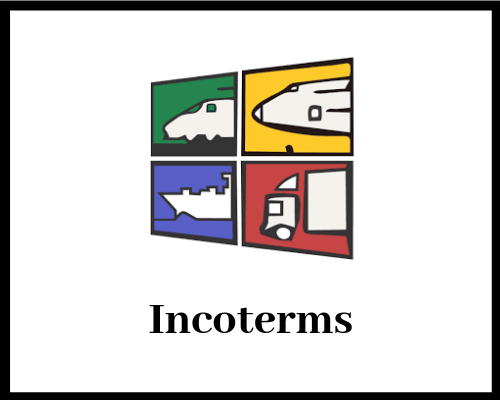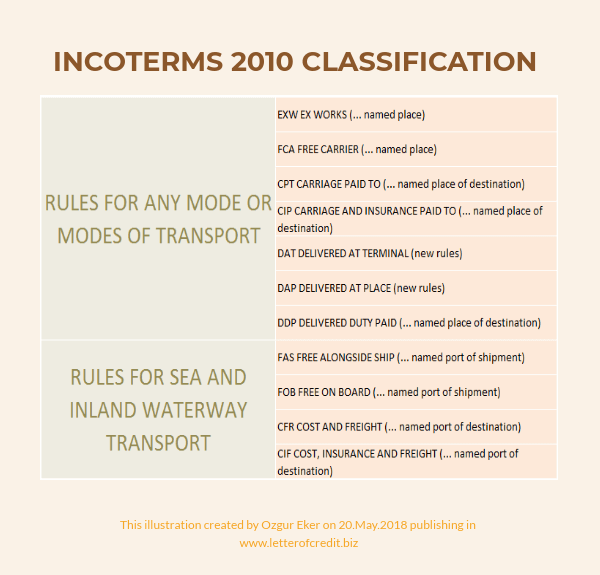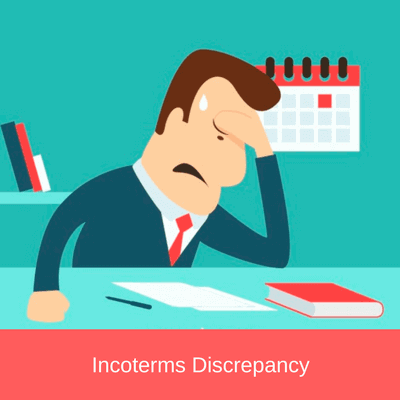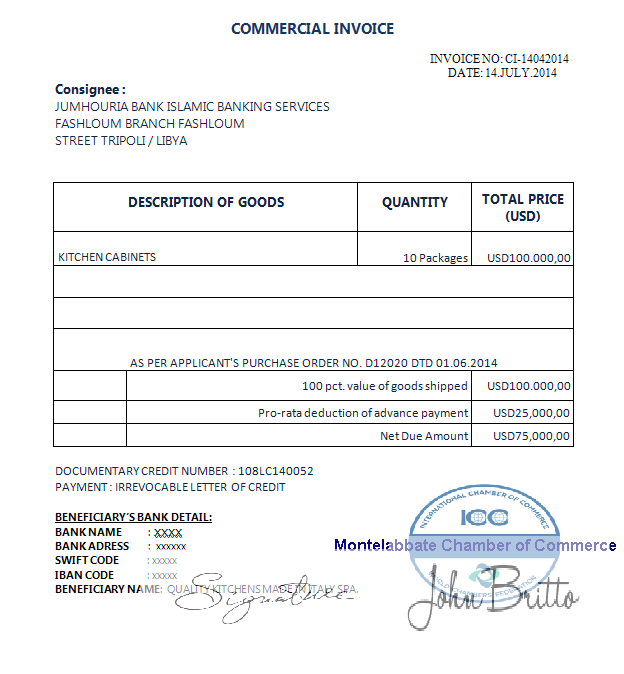What Does Incoterms Mean?
INCOTERMS (International Commercial Terms) have been created by the International Chamber of Commerce in order to reach an uniform set of international rules for the interpretation of trade terms in a global scale.
Pre-Incoterms Era: From Local Practices to Worldwide Trade Rules
Trade, -not only domestic, but also international -, has always been played a key role in development of the civilizations.
Traders follow the local practices, which have been created through hundreds of years.
But these practices have limited sphere of influence, so vital trade customs vary from one place to another.
As international trade emerged it was observed that different practices have been creating ambiguity for the traders.
Frequently, parties to a trade transaction are unaware of the different trading practices in their respective countries.
This can give rise to misunderstandings, disputes and litigation, with all the waste of time and money that this entails.
Buyers and sellers should know exactly what their obligations and rights are in a foreign trade transaction without leaving a possible source of uncertainty.
For example, the place of the delivery, the party who is responsible for making the contract of carriage and insurance, arranging the export and import procedures and paying the loading and unloading costs etc must have been precisely determined.
Additionally, the points indicated above are the core elements of a sales contract, which means that every sales contract must cover these point.
As a result they have to be re-written for every foreign trade transaction.
In order to prevent unnecessary repetitions, trade terms, which contain almost all of the vital parts regarding the obligations of the parties on a sales contract, have been created by various organizations.
But these initial trade terms had different interpretations in different countries, so they could not create an uniformity in practice.
Incoterms Era: Publication of First Incoterms and Revised Versions
INCOTERMS (International Commercial Terms) have been created by the International Chamber of Commerce in order to reach an uniform set of international rules for the interpretation of trade terms in a global scale.
First version of INCOTERMS published in 1936. These first rules were known as “Incoterms 1936”.
International trade terms have been revised regularly by ICC as follows:
- Incoterms 1953,
- Incoterms 1967,
- Incoterms 1976,
- Incoterms 1980,
- Incoterms 1990,
- Incoterms 2000,
- Incoterms 2010.
Incoterms 2010 is the latest publication.
Incoterms 2010 published in September 2010 and came into effect on 1 January 2011.
Incoterms 2000
Incoterms 2000 have been released in September 1999 under ICC publication number 560 and have entered into force on 1 January 2000.
Incoterms 2000 defines 13 rules.
Group E
- EXW EX WORKS (… named place)
Group F
- FCA FREE CARRIER (… named place)
- FAS FREE ALONGSIDE SHIP (… named port of shipment)
- FOB FREE ON BOARD (… named port of shipment)
Group C
- CFR COST AND FREIGHT (… named port of destination)
- CIF COST, INSURANCE AND FREIGHT (… named port of destination)
- CPT CARRIAGE PAID TO (… named place of destination)
- CIP CARRIAGE AND INSURANCE PAID TO (… named place of destination)
Group D
- DAF DELIVERED AT FRONTIER (… named place)
- DES DELIVERED EX SHIP (… named port of destination)
- DEQ DELIVERED EX QUAY (… named port of destination)
- DDU DELIVERED DUTY UNPAID (… named place of destination)
- DDP DELIVERED DUTY PAID (… named place of destination)
Incoterms 2010
Incoterms 2010 is the latest publication.
Incoterms 2010 published in September 2010 and came into effect on 1 January 2011.
There are 11 rules defined in Incoterms 2010 and they are all trademarked of ICC.
It is possible to purchase both hard copy and online version of Incoterms 2010 rules from ICC’s website.
Explanations of Incoterms 2010 Trade Terms:
The trade terms under Incoterms 2010 have been classified based on modes of transport.
Under Incoterms 2010, 7 trade terms can be used for any mode or modes of transport. These are:
- ex works, exw
- free carrier, fca
- carriage paid to, cpt
- carriage and insurance paid to, cip
- delivered at terminal, dat
- delivered at place, dap
- delivered duty paid, ddp
Whereas 4 trade terms under Incoterms 2010 can be used only for sea and inland waterway transport. These are:
- free alongside ship, fas
- free on board, fob
- cost and freight, cfr
- cost insurance and freight, cif
On this section I will be explaining the trade terms, which have been defined in Incoterms 2010 rules.
RULES FOR ANY MODE OR MODES OF TRANSPORT
EXW – Ex Works: “Ex Works” means that the exporter delivers the goods to the importer when exporter places the goods at the disposal of the importer at the exporter’s premises or at another named place such as exporter’s warehouse etc.
- The exporter does not need to load the goods on any collecting vehicle.
- The exporter does not need to clear the goods for export, where such clearance is applicable.
FCA – Free Carrier: “Free Carrier” means that the exporter delivers the goods to the carrier or another person nominated by the importer at the exporter’s premises or another named place.
If the named place is the exporter’s premises, delivery is completed when the goods have been loaded on the means of transport provided by the buyer.
In any other case, delivery is completed when the goods are placed at the disposal of the carrier or another person nominated by the buyer on the seller’s means of transport ready for unloading.
FCA requires the exporter to clear the goods for export, where applicable.
CPT – Carriage Paid to: “Carriage Paid To” means that the exporter delivers the goods to the carrier or another person nominated by the exporter at an agreed place (if any such place is agreed between the parties) and that the seller must contract for and pay the costs of carriage necessary to bring the goods to the named place of destination.
When CPT is used, the exporter fulfills its obligation to deliver when it hands the goods over to the carrier and not when the goods reach the place of destination.
CPT requires the seller to clear the goods for export, where applicable.
CIP – Carriage and Insurance Paid to: “Carriage and Insurance Paid to” means that the seller delivers the goods to the carrier or another person nominated by the seller at an agreed place (if any such place is agreed between the parties) and that the seller must contract for and pay the costs of carriage necessary to bring the goods to the named place of destination.
When CIP is used, the seller fulfills its obligation to deliver when it hands the goods over to the carrier and not when the goods reach the place of destination.
DAT – Delivered at Terminal: “Delivered at Terminal” means that the seller delivers when the goods, once unloaded from the arriving means of transport, are placed at the disposal of the buyer at a named terminal at the named port or place of destination.
“Terminal” includes any place, whether covered or not, such as a quay, warehouse, container yard or road, rail or air cargo terminal.
DAT requires the seller to clear the goods for export, where applicable.
Seller has no obligation to clear the goods for import, pay any import duty or carry out any import customs formalities.
DAP – Delivered at Place: “Delivered at Place” means that the seller delivers when the goods are placed at the disposal of the buyer on the arriving means of transport ready for unloading at the named place of destination.
The seller bears all risks involved in bringing the goods to the named place.
DAP requires the seller to clear the goods for export, where applicable.
Seller has no obligation to clear the goods for import, pay any import duty or carry out any import customs formalities.
DDP – Delivered Duty Paid: “Delivered Duty Paid” means that the seller delivers the goods when the goods are placed at the disposal of the buyer, cleared for import on the arriving means of transport ready for unloading at the named place of destination.
DDP requires the seller to clear the goods for export, where applicable.
Seller has to clear the goods for import, pay any import duty or carry out any import customs formalities.
RULES FOR SEA AND INLAND WATERWAY TRANSPORT
FAS – Free Alongside Ship: “Free Alongside Ship” means that the seller delivers when the goods are placed alongside the vessel (e.g., on a quay or a barge) nominated by the buyer at the named port of shipment.
FAS requires the seller to clear the goods for export, where applicable.
Seller has no obligation to clear the goods for import, pay any import duty or carry out any import customs formalities.
FOB – Free on Board: “Free on Board” means that the seller delivers the goods on board the vessel nominated by the buyer at the named port of shipment or procures the goods already so delivered.
FOB requires the seller to clear the goods for export, where applicable.
Seller has no obligation to clear the goods for import, pay any import duty or carry out any import customs formalities.
CFR – Cost and Freight: “Cost and Freight” means that the seller delivers the goods on board the vessel or procures the goods already so delivered. The risk of loss of or damage to the goods passes when the goods are on board the vessel.
CFR requires the seller to clear the goods for export, where applicable.
Seller has no obligation to clear the goods for import, pay any import duty or carry out any import customs formalities.
CIF – Cost, Insurance and Freight: “Cost, Insurance and Freight” means that the seller delivers the goods on board the vessel or procures the goods already so delivered.
The risk of loss of or damage to the goods passes when the goods are on board the vessel.
The seller must contract for and pay the costs and freight necessary to bring the goods to the named port of destination.
CIF requires the seller to clear the goods for export, where applicable.
Seller has no obligation to clear the goods for import, pay any import duty or carry out any import customs formalities.
What are the Main Differences Between Incoterms 2010 and Incoterms 2000?
There are 4 main differences exist in Incoterms 2010 comparing to Incoterms 2000. These amendments are:
Addition of New Incoterms Rules: Two new incoterms rules have been put into use with the Incoterms 2010 rules. These new rules are DAT and DAP.
Deleted Incoterms Rules: Four incoterms rules have been removed from the usage with the publication of Incoterms 2010. These no longer valid incoterms are DAF, DES, DEQ and DDU.
Changing the Classification of Rules: Incoterms 2010 divides incoterms into two main categories: Rules for any mode or modes of transport (ex works, free carrier, carriage paid to, carriage and insurance paid to, delivered at terminal, delivered at place, delivered duty paid) and rules for sea and inland waterway transport (free alongside ship, free on board, cost and freight, cost insurance and freight)
Definition of New Delivery Place for Incoterms FOB, CFR and CIF: According to Incoterms 2010, the goods will be delivered by exporter to importer only when they will be shipped on board a named vessel at the port of loading. In the previous version of the rules, Incoterms 2000, the goods have been considered as delivered once they have passed the ship’s rail.
How to Use Incoterms 2010 in Letters of Credit?
Incoterms are incorporated into sales contracts or proforma invoices, which are related to the sale of tangible goods.
In letters of credit, issuing banks generally use trade terms under field 45A – Description of Goods and Services.
If an issuing bank adds incoterms into the field 45-A Description of Goods and Services, then the beneficiary must include this exact incoterms phrase in to the commercial invoice.
Otherwise the issuing raises a discrepancy, which is known as incoterms discrepancy.
Example: Usage of Incoterms 2010 in a letter of credit
Field 45A: Description of Goods and Services
HYDROLIC PET BOTTLE BALING AND EQUIPMENT. CONFORM TO PROFORMA INVOICE NUMBER ADG-001 DTD 08.11.2012 CFR ALGIERS PORT-ALGERIA,INCOTERMS 2010 THIS MENTION SHOULD APPEAR ON COMMERCIAL INVOICE.
Commercial Invoice: Includes description of goods including the corresponding incoterms as stated in the letter of credit. (CFR ALGIERS PORT-ALGERIA, INCOTERMS 2010)
Sources:
- Incoterms® 2010 English Edition By the International Chamber of Commerce (ICC)
ICC Publication No. 715E, 2010 Edition - Incoterms 2010 Complete Guide, www.advancedontrade.com





